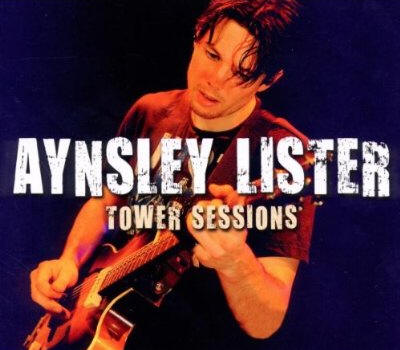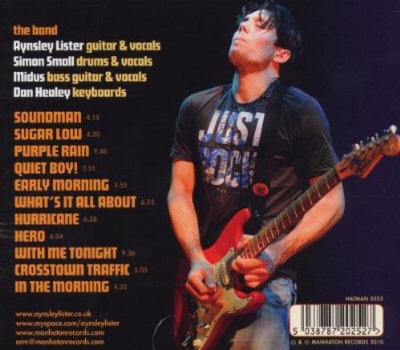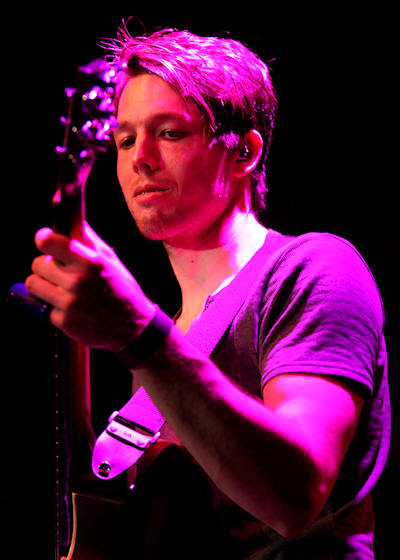
Painting © 2004 Loz
Arkle
Website
© Copyright 2000-2011 Alan White - All
Rights Reserved
Site optimised for Microsoft Internet Explorer
Early Blues Interview
|
|
"There is no doubt that Lister is one of those naturally exciting
talents that come along once in a blues moon. But more than the
God-given talent, it’s the balance that he strikes between stunning
guitar pyrotechnics, a soulful voice that has just enough of an edge and
a collection of original songs that mark him out as a musician with a
glittering future".
I was fortunate to meet up with Aynsley at the Burnley Blues Festival and the Linton Music Festival:
Aynsley: I’m Yorkshire born and bred but moved from there when I was 10 and lived in the Midlands ever since. Alan: What are your first musical memories? Aynsley: Messing around with an old guitar that my Dad had when I was a toddler. Never actually played anything but I was just fascinated with it and one day I dropped it, it snapped in half so I asked for a guitar of my own. They said that if I showed them that I really wanted it and was prepared to learn to play then they’d get me one for my birthday. So I got one of my own when I was 8. I’d always been surrounded by my Dad’s record collection which most evenings he’d have the stereo on and I grew up listening to blues, R&B (the proper R&B, not the current kind!) and I thought, “Yes, that’s what I want to play like, Clapton, Hendrix, Fleetwood Mac and all that kind of guitary-based blues stuff”. Alan: Did you come from a musical family? Aynsley: My Dad is a music fan although he’s not a musician. I think I’m kind of doing what my Dad always wanted to do but he’s never had the ability to play. He loves blues and listening to music and if I go round he’s always got the stereo on. I’ve got a couple of uncles and cousins who play but I wouldn't particularly say that I’ve got a musical family other than my Dad who always surrounded me with the sound of music. Alan: Did you always want to be a musician? Aynsley: All I knew was that I wanted to play guitar. I suppose if you ask any kid under the age of 10 then they’ll come out with all sorts of things but I just knew that I completely happy when I had a guitar in my hand and I’m the same now. I still love to just sit down and chill out with a guitar, not to practice just to sit down on my own for a couple of hours Alan: What kind of material were you playing in the early days? Aynsley: Predominantly British blues and I was really into 60’s era Clapton, John Mayall, that kind of stuff. When I first started playing live, it was blues that I tried to play and I always tried to go to blues jam sessions. When I started my own band when I was 18 or 19 I was playing all the stuff that I’d grown up listening to and as I progressed with that and started playing the odd tune here and there and it was received pretty well and I got signed to a label from the first couple of songs I wrote and that spurred me on to keep going. Alan: By the time you were 18 you’d been in several bands and then you formed your own, tell me about those times. Aynsley: When you play in a band as a collective you have 4 opinions so it’s always a compromise. If you’re playing 15 songs a night you might get 3 or 4 that you want to do but then you’ve got to do what the others want. I just always wanted to play blues, that’s all I was interested in at 18, so by having my own band it meant I could basically do what I wanted. I’d never sung before, I’d just played guitar so I started singing which, to be honest, scared the hell out of me to start with. But like anything the more you do something you get more comfortable and I started to enjoy it and I love the whole thing now, the whole thing of performing.
Aynsley: With those kind of things, there’s no real formula. As an artist you put yourself about and you phone as many agencies as you can, as many venues as you can, you do as many gigs as you can and try to build a reputation so there’s a bit of a buzz about you as an artist and hopefully then after 100 phone calls you might get one that says, “Yes, we’ll have you as the opening act”. In the early days I had a cracking manager, Martin Steer, who was really energetic and had the gift of the gab and he was really instrumental in my early years. Alan: In 2006 you were involved with Ruf Records Annual Blues Caravan with Ian Parker and Erja Lyytinen. Aynsley: Thomas Ruf has lots of crazy ideas and this particular idea was that every year he would take 3 of his artists and send them out as a package tour with a theme. I think we were either the 2nd or 3rd one and he asked if we wanted to go to America with this girl from Finland that we’d never heard of. So she got to go out with more established artists and we got more of a crossover audience. Each of us was to write 3 or 4 songs and we’d then collaborate and mix in and do an album together. I’d never done that before so the thought of going to Clarksdale, Mississippi and recording in all these really cool places really appealed. It worked really well, great fun. Alan: In 2008 you signed for Manhaton Records and I read that this has been quite a commercial boost for you.
Alan: You play contemporary blues and I read a quote describing your Equilibrium album: "his music flirts with the darker side of indie-rock but is anchored firmly and securely in the heart of the blues ... He has a lightness of feel, a new and expansive energy that will appeal to the younger listener still toying with the [blues] form... a new age bluesman". How would you describe your music? Aynsley: When I’m writing I don’t consciously think, “I’m going to write a blues song, or a slow song”, I just sit down and see what comes out. I write loads of songs, some of them make it past the demo stage and some of them don’t even get out of my bedroom. It’s just whatever comes out. I really like catchy melodies and tunes, the one thing I suppose in comparison with 15 years ago is that I can’t sit and listen to endless guitar solos, or blues after blues. I need more now to keep my interest as an artist and writer who is trying to put out as much variety as I can whilst still maintaining an identity.
Aynsley: I don’t really have any in particular. Every single time I write a song it always starts in a different way. Influences come from everywhere, perhaps I’ll be driving and listening to the radio and a really terrible pop song comes on but there might be a chord change or a melody that I like and can take and do something with it against a different backdrop. Alan: Tell me about the band – when did you get together? Aynsley: The band as we are now - I worked with Midus Guerreiro (the bass player) for about three and a half years and Dan Healey on keys for about two and a half years and Tim Brown joined us in September. So there’s not really a straight answer to that question and the band rarely stays the same for more than a year. Alan: Tell me about the making of your latest live album, 'Tower Sessions'. Aynsley: It was a long time
since I’d done anything live and I’d never actually had a good
experience with live recording. I don’t know if it’s just luck of the
draw but you can guarantee that if we do a tour of 15 dates it’ll be
great but the night we decide to record something will go wrong.
Somebody doesn’t quite feel on it that night, some technical
problem...it’s very risky because you are trying to capture in one night
everything that might happen on a tour. When you’ve got the audience
you seem to
Alan: You’ve just started a UK tour – is that going okay? Aynsley: Yes it is. We’re here today in Burnley and we’ve got a handful of festivals coming up including Scunthorpe, Dumfries. I love playing live. Alan: Good luck in the tour Aynsley and thank you for your time. _________________________________________________________________________
"UK guitar man Aynsley Lister’s recent crossover into
blues-meets-well-written-rock-song territory has been well received by
press and public alike. He began a 45 date tour of Europe towards the
end of last year and reports indicate that at the finishing line the man
and his band had gone way past top gear and entered the turbo zone in
terms of performance level. If you’re kicking yourself for missing it,
then compensation of a sort comes in the form of this new live CD which
was recorded during the final stages at Winchester’s Tower in January
2010. Opting for a live ‘greatest hits’ package, Aynsley and his band
blast through a set of audience favourites including a stunning
rendering of Prince’s anthemic
Purple Rain
The decision to add keyboard player Dan Healey proves to be an excellent
one as the overall sound of the band has never been better. We
particularly enjoyed the cover of Hendrix’s
Crosstown Traffic,
complete with ripping Strat solo – nice!" Check out Aynsley Lister at Burnley Blues Festival Check out Aynsley Lister at Linton Music Festival
_________________________________________________________________________
Return to
Blues Interviews List |









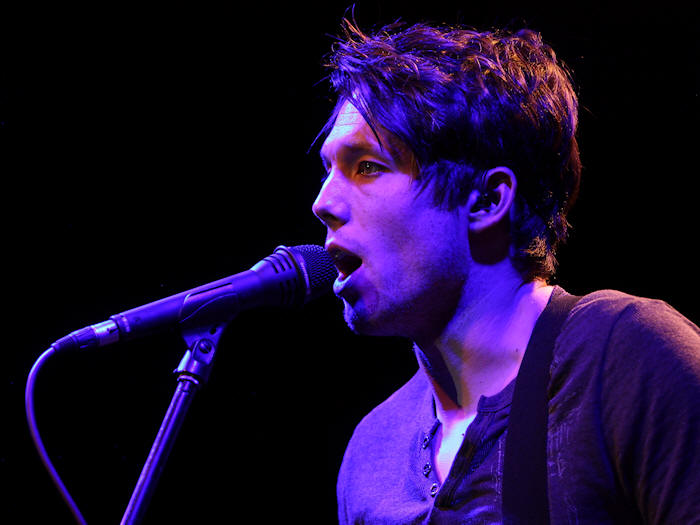
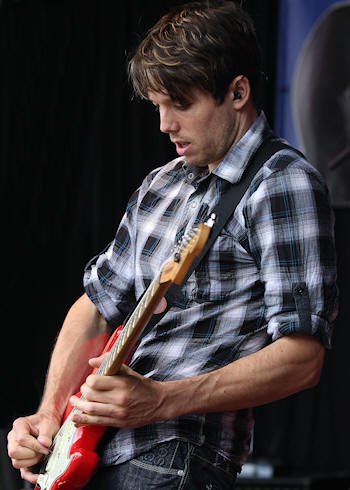 Alan:
I know you hail from the Midlands but where you were born?
Alan:
I know you hail from the Midlands but where you were born?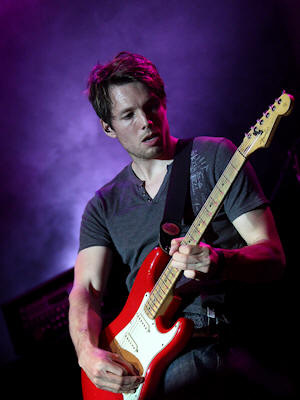 Alan:
Early in your career you worked with the likes of Buddy Guy, John
Mayall and Robert Cray. How did you get into those?
Alan:
Early in your career you worked with the likes of Buddy Guy, John
Mayall and Robert Cray. How did you get into those?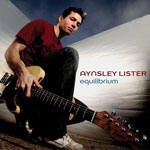 Aynsley:
I think the first CD I did for Manhaton (Equilibrium) I tried a
lot of new things in the studio that I’d never done before. Apart from
Blues Caravan I’d never worked with session players on my own material
but the idea was that we’d get specialists in some areas. Anything
guitar related I’d done but they wanted to get some different people in
to add colour and texture. I just did, well the money stuff I suppose,
sing the songs and play the cool lead stuff! We got a guy called Robbie
Macintosh in to play some guitar and bass and he’d just come off tour
with John Mayer which was a massive thing for me as I’m such a John
Mayer fan. I was over the moon that we’d got his collaborative
guitarist in to play on my album! The songs I’d written by that point
had gone quite cross-over commercial and I suppose in recent times I
listen less to blues and do now listen to more varied stuff. Maybe
unconsciously I was going into that John Mayer thing being a blues
guitarist with a really good mixture. So, Equilibrium was a
mixture of all my influences. There’s some blues songs on there, we did
a cover of Gnarls Barkley's Crazy – I did an acoustic blue grass version
just to put a different twist on it, there’s a couple of pop-rock things
on there. The title was to reflect the mixture and balance of
everything I hear when I’m writing.
Aynsley:
I think the first CD I did for Manhaton (Equilibrium) I tried a
lot of new things in the studio that I’d never done before. Apart from
Blues Caravan I’d never worked with session players on my own material
but the idea was that we’d get specialists in some areas. Anything
guitar related I’d done but they wanted to get some different people in
to add colour and texture. I just did, well the money stuff I suppose,
sing the songs and play the cool lead stuff! We got a guy called Robbie
Macintosh in to play some guitar and bass and he’d just come off tour
with John Mayer which was a massive thing for me as I’m such a John
Mayer fan. I was over the moon that we’d got his collaborative
guitarist in to play on my album! The songs I’d written by that point
had gone quite cross-over commercial and I suppose in recent times I
listen less to blues and do now listen to more varied stuff. Maybe
unconsciously I was going into that John Mayer thing being a blues
guitarist with a really good mixture. So, Equilibrium was a
mixture of all my influences. There’s some blues songs on there, we did
a cover of Gnarls Barkley's Crazy – I did an acoustic blue grass version
just to put a different twist on it, there’s a couple of pop-rock things
on there. The title was to reflect the mixture and balance of
everything I hear when I’m writing.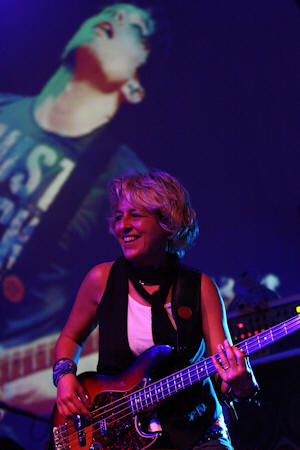 Alan:
Who would you say are your main influences?
Alan:
Who would you say are your main influences?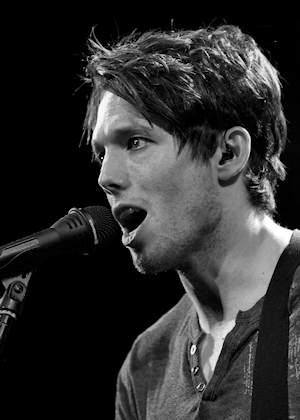 get
that red light feeling, everybody tenses up. Every time I’ve done a
live recording in the past, the night after we’ve always had the
most amazing gig. I added keyboard to the line up about two and a half
years ago and as a guitarist I had to adapt my style a bit, I didn’t
have to play as loud and I could almost stop playing sometimes and back
off. It completely changed the dynamic of the band and it took me about
6 or 8 months to get used to it. It got to the point where we’d toured
for about 18 months and it was sounding, in my opinion, really really
good. We’d just come off tour, it was all really well-oiled, everyone
knew the songs inside out and we’d got all these songs to a point where
I thought they’d never sounded as good. So it was a bit of an
experiment really so I thought that at the end of the tour before
everybody cools off and goes on holiday let’s just get together and
record. No audience but let’s play the set through a couple of times and
see if we capture something. If we don’t, no pressure. We got together
at a place in Winchester called The Tower which is cracking sounding
room acoustically, very rewarding. We set up and played each song 2 or
3 times although there were a couple that we played once and decided we
didn’t need to do it again. One of those was Purple Rain. On the album
there are three songs that are first takes and the rest are all
seconds. I suppose it’s not a live album in the traditional sense with
an audience but when we played it back I was, and still am, really happy
with it and I think we captured the best of what we had at that time and
it captures that live energy.
get
that red light feeling, everybody tenses up. Every time I’ve done a
live recording in the past, the night after we’ve always had the
most amazing gig. I added keyboard to the line up about two and a half
years ago and as a guitarist I had to adapt my style a bit, I didn’t
have to play as loud and I could almost stop playing sometimes and back
off. It completely changed the dynamic of the band and it took me about
6 or 8 months to get used to it. It got to the point where we’d toured
for about 18 months and it was sounding, in my opinion, really really
good. We’d just come off tour, it was all really well-oiled, everyone
knew the songs inside out and we’d got all these songs to a point where
I thought they’d never sounded as good. So it was a bit of an
experiment really so I thought that at the end of the tour before
everybody cools off and goes on holiday let’s just get together and
record. No audience but let’s play the set through a couple of times and
see if we capture something. If we don’t, no pressure. We got together
at a place in Winchester called The Tower which is cracking sounding
room acoustically, very rewarding. We set up and played each song 2 or
3 times although there were a couple that we played once and decided we
didn’t need to do it again. One of those was Purple Rain. On the album
there are three songs that are first takes and the rest are all
seconds. I suppose it’s not a live album in the traditional sense with
an audience but when we played it back I was, and still am, really happy
with it and I think we captured the best of what we had at that time and
it captures that live energy.